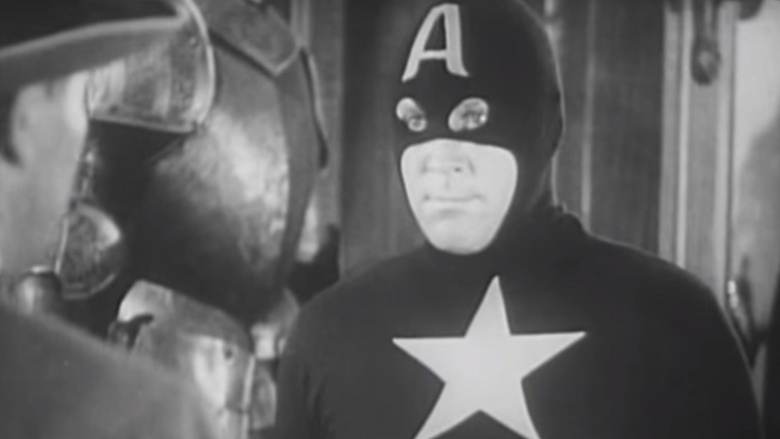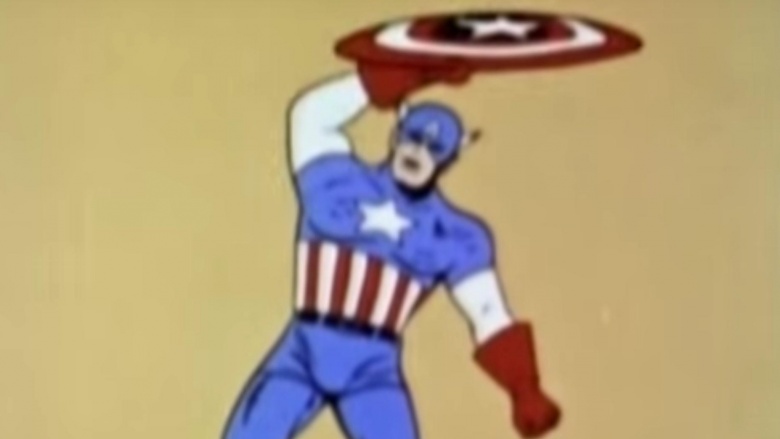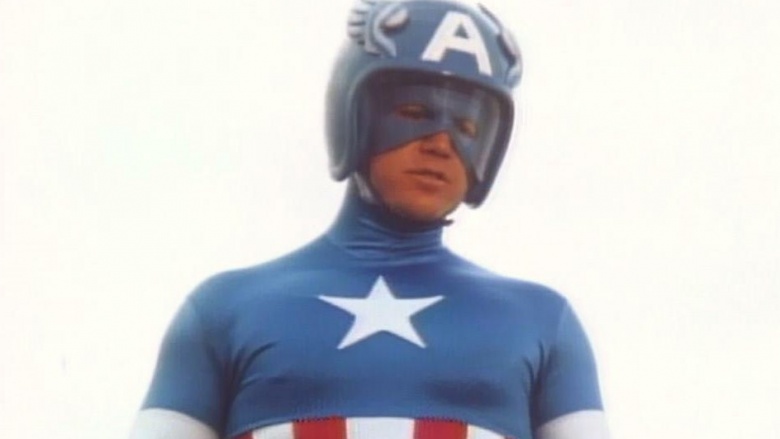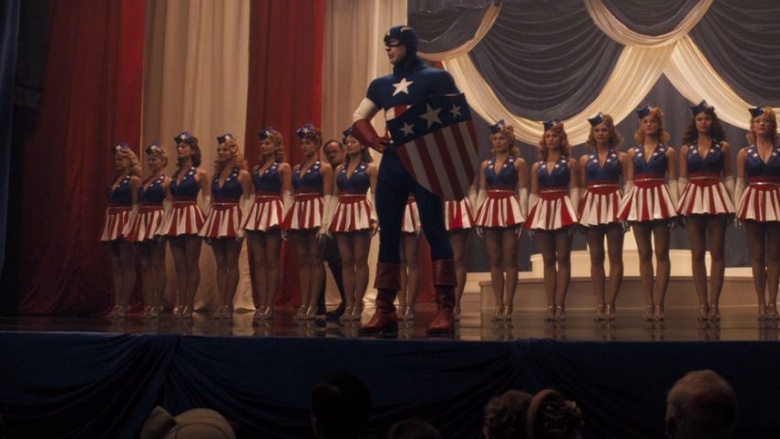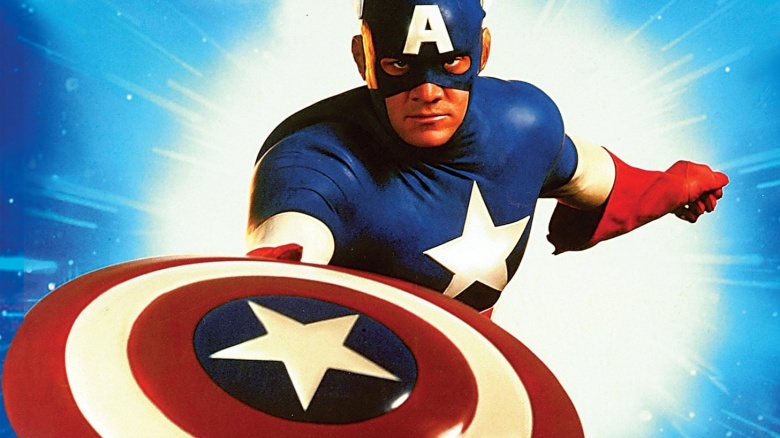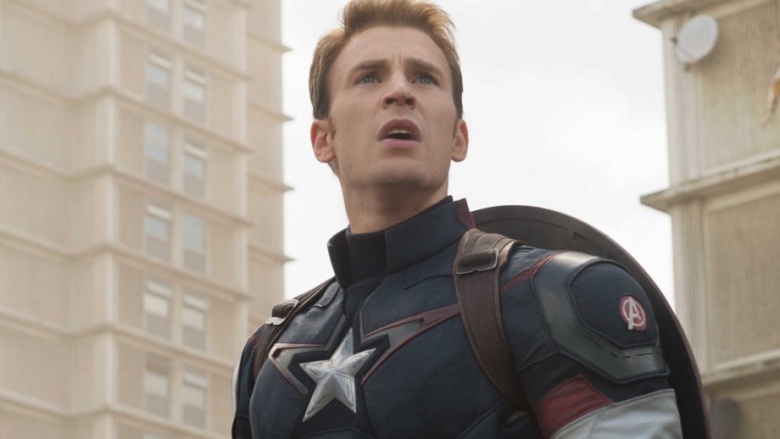Awful Adaptations: Captain America
By now just about everyone knows the story of Captain America: shedding his secret identity as mild mannered District Attorney Grant Gardner, Cap springs into action on his flying motorcycle to do battle with his archenemy, the Italian criminal known as The Red Skull! Wait, what?
Yes, that may sound like some kind of peyote-fueled nightmare, but in the case of Captain America, truth is sometimes stranger than fiction. While modern fans know Captain America as the Marvel cinematic universe's First Avenger, the Chris Evans version of Cap is just the latest in a very long line of film and television adaptations. Some of which have been, shall we say, a little more faithful to the character than others.
So if you thought you knew Captain America, well, keep reading. Because even Stan Lee couldn't have come up with a story as bizarre as the unlikely true history of Captain America's many adaptations.
Captain America And The Dynamic Vibrator
In 1944, Republic Pictures decided to cash in on the era's comic book boom by filming a 12-part serial featuring America's Sentinel of Liberty, Captain America. And then they proceeded to chuck most of the stuff from the comics straight out the window, turning Cap into stolid district attorney Grant Gardner and making his archenemy a grumpy archaeologist armed with something actually called the Dynamic Vibrator.
Played by the slightly tubby Dick Purcell, Captain America was surprisingly well-received by critics. However, it never got a sequel, due to the fact that the out of shape Purcell died of a heart attack shortly before release, apparently caused by the strain of filming all those action sequences. It's not easy being a superhero.
When Captain America Throws His Mighty Shield!
Like most superheroes, Captain America fell out of favor in the 1950s, but thanks to the Marvel revival, by 1966 he was back in the headlines, appearing alongside several of his fellow Avengers in the bare bones animated television anthology The Marvel Super Heroes.
Calling it animated is maybe giving The Marvel Super Heroes more credit than it deserves, though, as the show was barely more than photos of comic book panels backed with terrible voice acting. But the Captain America cartoon did have at least one claim to fame: maybe the worst theme song of all time. We're betting any kid caught on the playground singing "when Captain America throws his mighty shield, all those who chose to oppose his shield must yield" probably got the crap kicked out of him on the regular.
Easy Rider and Captain America II: Death Too Soon
The 1969 film Easy Rider was an instant counterculture classic thanks in part to Peter Fonda's iconic portrayal of a free-spirited biker known by the nickname Captain America. That popularity led to Marvel's Captain America suddenly getting a new motorcycle in the comics. And that in turn eventually led to one of the doofiest ideas in Hollywood history, the made-for-TV movies Captain America and Captain America II: Death Too Soon.
Surprising CBS viewers in 1979 with a unique blend of aggressive nonsense and utter ineptitude, the two Cap TV films took their cues less from the comics or even from Easy Rider and more from '70s stunt icon Evel Knieval. Riding a special motorcycle armed with jet thrusters, deployable glider wings, and a detachable windscreen that doubled as his shield, this version of Cap defied both death and logic while taking on such terrible threats as a gang of muggers stealing Social Security checks. Man, Ultron seems like a real pansy now!
Captain America The Musical
Undoubtedly the weirdest adaptation of Cap, though—and maybe the weirdest adaptation in comics history—is the unproduced 1986 Broadway musical Captain America. We swear we are not making this synopsis up: an aging Steve Rogers, facing a mid-life crisis of faith in America, regains his sense of self and country when his ex-girlfriend becomes President of the United States.
There was also a 12-year old girl named Mister who acted as Cap's sidekick and conscience, as well as a healthy dose of Reagan-era political satire, a concert by the Grateful Dead, and what McCall magazine described as "ballet/pantomime aided by hydraulics, black lights, ersatz lasers and projection." Plus, of course, an absolute pantload of patriotic singing and dancing. Hard to believe, but the musical never made it to the stage.
Captain America And The Fake Vomit Maneuver
You'd think the failed musical would be the lowest point for Captain America fans, but the musical actually had one thing going for it: at least nobody ever had to watch it. The same cannot be said, alas, for the 1990 big screen film adaptation Captain America.
Featuring author J.D. Salinger's son Matt Salinger as Cap, this version was made on a shoestring budget, though that's really not being fair to shoes. It also took some liberties with the story, making The Red Skull an Italian fascist rather than a Nazi, and replacing Cap's usual sidekick Bucky with, um, Ned Beatty. Best of all, though, Captain America manages to escape sticky situations not once but twice by deploying that age old superhero maneuver: pretending to be carsick and then running away when let out to vomit. We can only assume that's how Thanos will be defeated in Avengers: Infinity War.
The Marvel Cinematic Universe
Given Captain America's inglorious history in film and television, it's no wonder the company decided to take a step back after the 1990 Captain America fiasco. For the next two decades, Cap appeared in video games, novels, and occasionally cartoons like X-Men or Spider-Man, but only sparingly—and with care taken not to screw things up. For instance, a planned Captain America cartoon in the '90s that would have given Cap the new secret identity of Tommy Tompkins was blissfully scrapped.
So next time you want to quibble about some plot point in Avengers: Age of Ultron not quite making perfect sense, just think about the Captain America musical, his flying motorcycle, and the fake vomit maneuver—and remember exactly how bad the Marvel cinematic universe really could have been.

